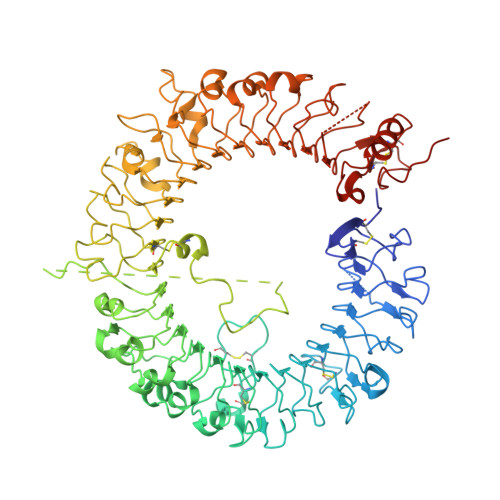Tetrasubstituted imidazoles as incognito Toll-like receptor 8 a(nta)gonists.
Yang, Y., Csakai, A., Jiang, S., Smith, C., Tanji, H., Huang, J., Jones, T., Sakaniwa, K., Broadwell, L., Shi, C., Soti, S., Ohto, U., Fang, Y., Shen, S., Deng, F., Shimizu, T., Yin, H.(2021) Nat Commun 12: 4351-4351
- PubMed: 34272380
- DOI: https://doi.org/10.1038/s41467-021-24536-4
- Primary Citation of Related Structures:
7CRF - PubMed Abstract:
Small-molecule modulators of TLR8 have drawn much interests as it plays pivotal roles in the innate immune response to single-stranded RNAs (ssRNAs) derived from viruses. However, their clinical uses are limited because they can invoke an uncontrolled, global inflammatory response. The efforts described herein culminate in the fortuitous discovery of a tetrasubstituted imidazole CU-CPD107 which inhibits R848-induced TLR8 signaling. In stark contrast, CU-CPD107 shows unexpected synergistic agonist activities in the presence of ssRNA, while CU-CPD107 alone is unable to influence TLR8 signaling. CU-CPD107's unique, dichotomous behavior sheds light on a way to approach TLR agonists. CU-CPD107 offers the opportunity to avoid the undesired, global inflammation side effects that have rendered imidazoquinolines clinically irrelevant, providing an insight for the development of antiviral drugs.
- School of Pharmaceutical Sciences, Key Laboratory of Bioorganic Phosphorous Chemistry and Chemical Biology (Ministry of Education), Department of Chemistry, Beijing Advanced Innovation Center for Structural Biology, Tsinghua-Peking Joint Center for Life Sciences, Tsinghua University, Beijing, China.
Organizational Affiliation:
























